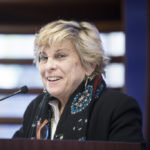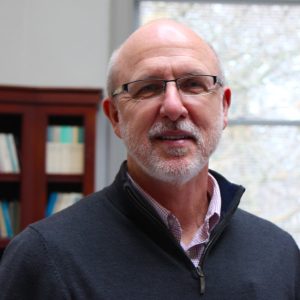Friends of ICABR

Julian Alston
University of California, Davis
Julian Alston is a distinguished professor in the Department of Agricultural and Resource Economics at the University of California, Davis, where he studies the causes and consequences of government policy affecting agriculture and food, including science and technology policy and the economics of agricultural innovation, as well as food and nutrition policy, and the global challenges of poverty, malnutrition, and obesity. At UC Davis, Julian also serves as director of the Robert Mondavi Institute Center for Wine Economics, and is engaged in a variety of projects on the economics of wine and beer.
Dr. Alston’s UC Davis webpage.

Bruce Babcock
Emeritus of Iowa State University
Bruce Babcock is a professor in the Department of Economics at Iowa State University where he holds the Cargill Chair in Energy Economics and directs the Biobased Industry Center. Bruce conducts research issues affecting agriculture and food production with a recent emphasis on the impact of biofuels and biofuel policy on food markets and the environment. Bruce’s other areas of expertise include modeling agricultural production risk and the development of innovative risk-transfer mechanisms to manage farm income risk. He received his Ph.D. from UC Berkeley and BS and MS degrees from UC Davis.

David Castle
University of Victoria
David Castle is Vice-President Research and a Professor in the School of Public Administration with an adjunct appointment in the Gustavson School of Business.. His research focuses on social aspects of life science innovation including democratic engagement, regulation and governance, and intellectual property and knowledge management. He has published extensively on the social dimensions of science, technology and innovation, has held several major research awards, and has considerable experience leading strategic research initiatives and research project management. Dr. Castle has consulted widely to government and industry on issues such as the impact of national technology transfer policies and programs, intellectual property and knowledge management strategies, and the role of non-scientific considerations in the regulation of science and technology.

Matty Demont
IRRI
Matty is a senior economist in the Social Sciences Division at the International Rice Research Institute (IRRI) in Los Baños, Philippines. Matty currently leads IRRI’s newly created market and value chain research team that aims at making rice research more market-driven. Matty’s team provides research support in product profiling and market segmentation which enables IRRI, R&D partners and rice value chain stakeholders to proactively adjust their focus and steer markets when new opportunities arise for reducing poverty and improving nutrition in Asia, and East and Southern Africa. Matty graduated from University of Leuven in Belgium where he conducted his PhD and Post-doc research (2002–2007) on the impact of biotechnology innovations and the EU coexistence policy on European agriculture. His main areas of expertise are experimental value chain research, consumer economics, food quality, labeling and branding, market research, development policy and impact assessment.

Nicholas Kalaitzandonakes
University of Missouri-Columbia
Nicholas Kalaitzandonakes is the MSMC endowed professor of agribusiness strategy and the director of the Economics and Management of Agrobiotechnology Center (EMAC) at the University of Missouri-Columbia. His research, teaching and outreach focus on the economics and policy of agrifood biotechnology and other agribusiness innovations.

Leslie Lipper
Retired from FAO
Leslie Lipper is a senior environmental economist in the agriculture and development economics division at FAO. She has worked there over the past ten years developing a program of research on natural resource economics and poverty reduction program. She was involved in the FAO representation to the UNFCCC climate negotiations on the topic of agricultural mitigation and food security. She is currently leading work in ESA analyzing synergies and tradeoffs between food security, mitigation and adaptation and the potential to link mitigation financing to smallholder agricultural development activities.

Anwar Naseem
Rutgers, The State University of New Jersey
Anwar Naseen is Associate Research Professorm Department of Agricultural, Food, and Resource Economics at Rutgers University. Before this he was Assistant Professor, Department of Agricultural Economics of McGill University. His specialization is in the fields of Economics of science and technology, impact and regulation of agricultural biotechnology, intellectual property rights, modelling mixed R&D oligopolies; International agricultural development, the role of private sector in agricultural R&D, science policy. Prior to joining McGill, he was a Postdoctoral Fellow at International Food Policy Research Institute (IFPRI) based in Ethiopia. His areas of interest include agricultural development, economics of innovation, science and technology policy, and industrial organization. He has a Ph.D. from the Department of Agricultural Economics at Michigan State University.
Dr. Naaseem’s personal google webpage.

Robert Paarlberg
Harvard Kennedy School
Robert Paarlberg is Adjunct Professor of Public Policy at the Harvard Kennedy School. From 1976 until 2015 he was Professor of Political Science at Wellesley College. He received his B.A. from Carleton College and earned a PhD in International Relations from Harvard University. He is the author of six university press books, including Food Politics: What Everyone Needs to Know (Oxford 2013) and The United States of Excess: Gluttony, and the Dark Side of American Exceptionalism (Oxford 2015). Paarlberg has been a member of the Board of Agriculture and Natural Resources at the National Research Council of the National Academies, and was a member of the Board of Directors of Winrock International. He currently serves as Chair of the Independent Steering Committee of the Agriculture for Nutrition and Health Research Program at the CGIAR.

Luigi Pagenetto
Fondazione Universitaria Economia Tor Vergata Ceis
Luigi Paganetto is full Professor of International Economics at the University of Rome “Tor Vergata”, President of the Tor Vergata Economics Foundation, Secretary General of the International Economic Association (IEA) and President of CEIS (Center for International Studies on Economic Growth) at the University of Rome “Tor Vergata”. He has been Dean of the Faculty of Economics at the University of Rome “Tor Vergata”, President of ENEA (Italian National Agency for New Technologies, Energy and the Environment), Member of ENEA technical scientific committee, Council of the Ministry for Foreign Affairs Institute, Member of the High Level Group for the Lisbon objectives (Kok Group for the Lisbon strategies) – European Commission, Member of Council of the Ministry for Foreign Affairs Institute, President of the Scientific Committee IADB (Inter American Development Bank). Author of articles and books in Macroeconomic Theory, International Economics and Italian end European Industrial Economics

Peter Phillips
University of Saskatchwan
Dr. Phillips is Distinguished Professor and Founding Director of the Johnson-Shoyama Center for the Study of Science and Innovation Policy. He earned his Ph.D. at the LSE and practiced for 13 years as a professional economist in industry and government. At the University of Saskatchewan, he was the Van Vliet Research Professor, created and held an NSERC-SSHRC Chair in Managing Technological Change in Agriculture, was director of the virtual College of Biotechnology, was founding director of the JSGS. He has had appointments at the LSE, OECD, European University Institute in Florence, University of Edinburgh and University of Western Australia. He was a founding member of the Canadian Biotechnology Advisory Committee and was on the boards of Canadian Agri-food Policy Institute, Pharmalytics and Ag-West Bio Inc. He has held >15 peer-reviewed grants worth >$250 million and is author/editor of 15 books, >60 journal articles and >55 book chapters. He has research projects and has published on: intellectual property management; innovation systems; trade, marketing, regulation and supply chain management of new technologies; the economic impact of agricultural biotechnology; and governance theory and practice.

David J. Spielman
IFPRI
David J.Spielman a U.S. national, joined the International Food Policy Research Institute (IFPRI) in 2004, and is currently a research fellow based in Washington, DC. His research agenda covers a range of topics including agricultural science, technology and innovation policy; seed systems and input markets; and community-driven rural development. Prior to this, David worked on agriculture and rural development issues for IFPRI in Addis Ababa, Ethiopia, the World Bank in Washington, D.C., the Aga Khan Development Network in the Northern Areas, Pakistan, and several other organizations. His work maintains a regional emphasis on East Africa and South Asia. He received a Ph.D. in Economics from American University in 2003, an M.Sc. in Development Studies from the London School of Economics in 1993, and a B.A. in International Relations from Tufts University in 1992.

Jennifer Thomson
University of Cape Town
Jennifer Thompson has a BSc in Zoology from the University of Cape Town, an MA in Genetics from Cambridge University and a PhD in Microbiology from Rhodes University, South Africa. After a post-doctoral fellowship at Harvard, she was a Lecturer and Assoc. Professor at the University of the Witwatersrand and then started and ran the Laboratory for Molecular and Cell Biology for the Council for Scientific and Industrial Research. She was appointed Professor and Head of the Department of Microbiology at UCT in 1988, a position she held for 12 years. She won the L’Oreal/UNESCO prize for Women in Science for Africa in 2004 and was awarded an Honorary Doctorate from the Sorbonne University, Paris in 2005. She has published two books on the subject of Genetically Modified Organisms: Genes for Africa and Seeds for the Future. She is currently Emeritus Professor in the Department of Molecular and Cell Biology at UCT.

Greg Traxler
Retired from University of Washington
Greg Traxler is a Senior Lecturer in the Evans School of Public Policy and Governance at the University of Washington. Previously he was Senior Program Officer at the Bill & Melinda Gates foundation and Professor in the Department of Agricultural Economics at Auburn University. Traxler’s research and teaching focus on the economics of science and technology. He has authored studies on the impacts of genetically modified (GM) cotton in the U.S. and Mexico, GM soybeans in Argentina, and GM papaya in Thailand. Other studies have looked at the effect of monopoly power and economies of size in technology generation, and on the value of pre-commercial germplasm. At the Gates foundation Traxler developed and managed a portfolio of grants to support building the capacity for agricultural policy analysis and implementation in Sub-Saharan Africa and South Asia.

Giovanni Tria
University of Rome Tor Vergata - CEIS
Giovanni Tria is President of the Italian National School of Public Administration (SSPA). He is a full professor of Economics, Faculty of Economics, University of Rome “Tor Vergata”. He is a member of the “OECD Innovation Strategy Expert Advisory Group” and Vice Chair ?Committee for Information, Computer and Communication Policy (ICCP) and Delegate of the Italian Government at the Governing Body of ILO (International Labour Office). He was Director of CEIS (Centre for Economic and International Studies) – University of Rome Tor Vergata from 2002 to 2009. He is an economist with more than 30 years of professional and academic experience. He has an ongoing programme which analyses the civil judicial system and its impact upon the economy, the relationship between corruption, productivity and growth, the economy of the criminal, and fiscal federalism. An expert of economic development, business cycle and growth, public investment assessment and project evaluation, role of the governance of the institutions on the process of growth, productivity and growth in the services sector, he has extensively worked in the formulation and management of macroeconometric models for economic forecast and simulation of economic policies, contributing to periodical formulation of economic forecast reports. He is an expert in cost benefit analysis as applied to public investments.

Anneleen Vandeplas
European Commission
Anneleen Vandeplas is an economist in the European Commission Directorate-General for Economic and Financial Affairs. Prior to this, she was a researcher at LICOS – Centre for Institutions and Economic Performance at KU Leuven (Belgium). Her research comprises both theoretical and empirical analyses of the role of institutions in economic development. She has conducted extensive field work in India, and been involved in research projects commissioned by FAO, IFPRI, the European Commission and World Bank. Her special interest lies in the field of agricultural supply chain transformation and its impact on poor farmers in developing countries. She holds an M.Sc. in Bio-engineering, an M.Sc. in Advanced Studies in Economics, and a PhD in Economics from the K.U.Leuven, and an MA in International and Development Economics from the University of Namur (FUNDP) in Belgium.

Liebeth Vranken
KU Leuven GEO-Institute
Liebeth Vranken On the 1st of October 2010, Liesbet Vranken started working as a professor in Bio-Economics and Policy at the Division of Agricultural and Food Economics, Department of Earth and Environmental Sciences, KULeuven. Within the Division of Agricultural and Food Economics, she is head of the Research Group Society-Environment Interactions. Before joining the Department of Earth and Environmental sciences, she worked as an assistant professor at the Centre for Corporate Sustainability at the HUBrussel and as an environmental economist at VITO – Flemish Institute for Technological Research. Liesbet Vranken holds a Master in Bio-engineering and a PhD in economics, both from the University of Leuven. In her research, she is studying the link between economic and ecological models by refining functions of socio-economic drivers that are used to model resource use changes and changes in ecosystem services, and by analysing how institutions (policy decisions and regulations) affect this link. For that purpose, she (a) develops integrative quantitative models of human and environmental systems based on spatial econometrics for the analysis of natural resources management policies; (b) develops methods to valuate ecosystem services and transfer valuation results to other sites while dealing with the uncertainty surrounding the future consequences of a policy or land management regime. Liesbet Vranken has a particular interest in studying the development and institutional framework of land markets and focuses on analysing the impact of agricultural and environmental policies on economic development and environmental performance.

José Falck Zepeda
CGIAR
Joined IFPRI in 2004 as a Research Fellow. His work at IFPRI focuses on the economics and impact assessment of biotechnology, biosafety and emerging technologies. In addition, José focuses on agricultural R&D policy and technogical innovation in developing countries. Prior to joining IFPRI, José Falck-Zepeda worked as a Research Fellow at the International Service for National Agricultural Research (ISNAR) in the Hague, the Netherlands. He also was a Post Doctoral Research Fellow at Auburn University, Alabama, and Assistant Professor and an Instructor at the Panamerican Agricultural School (Zamorano University) in Honduras. A citizen of Honduras, he holds and Agrónomo Degree from Panamerican Agricultural School (Zamorano University).
